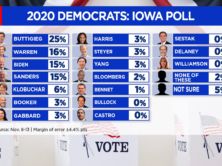
A screenshot of a video about the pipeline from TransCanada's website. (Credit: Keystone-Xl.com, screenshot)
The decision on whether to authorize building the XL Pipeline, which would transport oil from the tar sands in Canada to refineries in Texas, is still being evaluated by the U.S. State Department. But a new poll suggests Americans already support the pipeline’s construction by a wide margin.
Don’t believe it.
Most Americans admit knowing little to nothing about the pipeline, and if given the opportunity, they would admit they also don’t have an opinion about it.
But that doesn’t prevent pollsters from manufacturing the illusion of a supportive public. Reporting on the United Technologies/National Journal Connection Poll, National Journal’s polling editor, Steven Shepherd, writes: “While the Obama administration mulls whether to approve the controversial Keystone XL pipeline, Americans are already decided.” (emphasis added)
But the poll never asked respondents if they had actually decided. Instead, the question was phrased in a forced-choice format, which pressured respondents to come up with an opinion:
“The President is deciding whether to build the Keystone XL pipeline to carry oil from Canada to the United States.
“Supporters of the pipeline say it will ease America’s dependence on Mideast oil and create jobs. Opponents fear the environmental impact of building a pipeline.
“What about you? Do you support or oppose building the Keystone XL pipeline?”
The results showed 67% in support, 24% opposed, and 9% volunteering no opinion.
The poll never asked respondents if they had heard anything about the pipeline, nor did it offer the respondents an explicit option of “don’t know.” And it made no attempt to determine how strongly their respondents felt about the pipeline.
The very fact that the poll gave respondents information before asking about the issue is evidence that most people know very little about the matter, and the pollster knows it. So, the interviewers give a superficial description to the respondents, who are then expected to make a snap judgment about whether they support or oppose the pipeline. And that snap judgment is then characterized as though the public has “already decided.”
How unaware is the public of the pipeline? Gallup asked about that a year ago last March, and at the time, only 20% of its respondents said they had been following the news about the pipeline very closely, with another 29% saying “somewhat” closely, and the rest (50%) not following the issue.
It’s possible more people have become aware of the issue over the past year, but certainly not the 91% the current poll implies. But when pollsters work so closely with the media outlets that hire them, they are not interested in reporting that most people really don’t have a meaningful opinion on the matter.
Instead, they interview mostly low-information, unengaged Americans, bombard them with biased information, and demand an immediate opinion – which we readers are supposed to treat as representative of what the public wants.
Readers beware!






